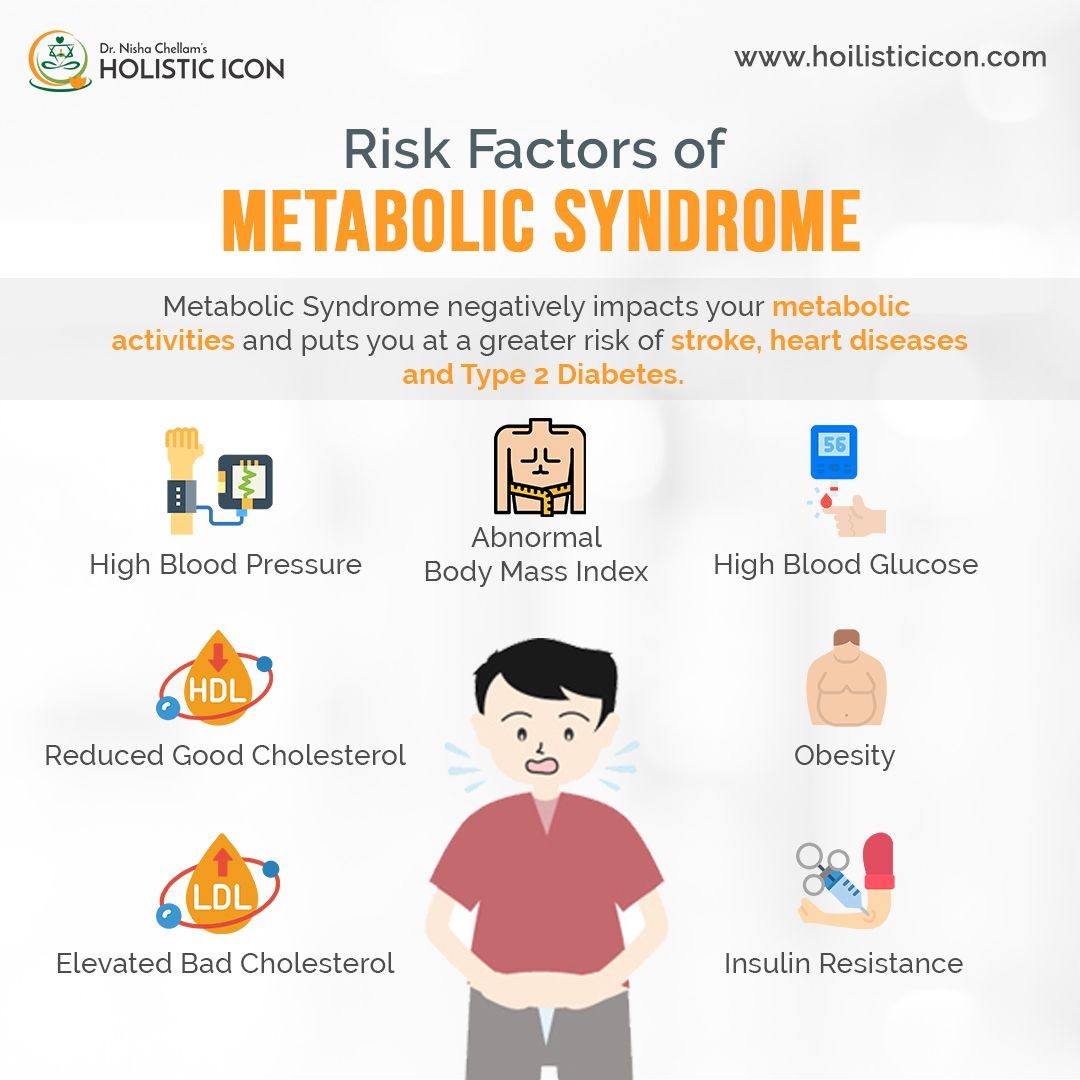
Contents
- 1 Metabolic Syndrome: Symptoms and Causes
- 1.0.1 What is metabolic syndrome?
- 1.0.2 What are the five signs of metabolic syndrome?
- 1.0.3 What are the symptoms of metabolic syndrome?
- 1.0.4 How common is metabolic syndrome?
- 1.0.5 What causes and what are the risk factors of metabolic syndrome?
- 1.0.6 What is the treatment for metabolic syndrome?
- 1.0.7 Diet and metabolic syndrome
- 1.0.8 Subscribe to MedicineNet’s Diabetes Newsletter
- 1.0.9 Exercise and metabolic syndrome
- 1.0.10 Cosmetic surgery to remove fat
- 1.0.11 What if lifestyle changes are not enough to treat metabolic syndrome?
Metabolic Syndrome: Symptoms and Causes
Metabolic syndrome refers to a cluster of health conditions that increase the risk of heart diseases, stroke, and diabetes.
Metabolic syndrome is a significant risk factor for both type 2 diabetes and heart disease, two of the most common and important chronic diseases today.
- Metabolic syndrome is associated with fatty liver, inflammation, and the potential for cirrhosis.
- Microalbuminuria, the leaking of protein into the urine, is an indication of kidney damage related to metabolic syndrome.
- Other problems associated with metabolic syndrome include:
- obstructive sleep apnea
- polycystic ovary syndrome
- increased risk of dementia with aging
- cognitive decline in the elderly
Metabolic syndrome summary
Choosing healthier lifestyles such as exercise, weight loss, and managing blood pressure, cholesterol, and triglyceride levels may decrease the risk of developing metabolic syndrome.
The key takeaway is to make healthy lifestyle changes. Some suggestions include:
- Invite a buddy to exercise with you.
- Take a walk during your work break.
- Increase consumption of fruits and vegetables and decrease consumption of fats.
- Shop at healthy food stores.
- Evaluate your children’s diet.
- Encourage children to play outside.
It all adds up. Preventing metabolic syndrome means adopting a healthy lifestyle.
What is metabolic syndrome?
Metabolic syndrome is a cluster of metabolic risk factors that come together in a single individual. These factors include insulin resistance, high blood pressure, cholesterol abnormalities, and an increased risk for blood clotting. Most affected individuals are overweight or obese. The association between metabolic disorders and cardiovascular disease has been known since the 1940s.
Metabolic syndrome is also known as syndrome X, insulin resistance syndrome, or dysmetabolic syndrome.
What are the five signs of metabolic syndrome?
According to guidelines from the National Heart, Lung, and Blood Institute (NHLBI) and the American Heart Association (AHA), any three of the following traits in the same individual meet the criteria for metabolic syndrome:
- Abdominal obesity: a waist circumference of 102 cm (40 in) or more in men and 88 cm (35 inches) or more in women. For Asian Americans, the cutoff values are ≥90 cm (35 in) in men or ≥80 cm (32 in) in women
- Serum triglycerides: 150 mg/dl or above.
- HDL cholesterol: 40 mg/dl or lower in men and 50mg/dl or lower in women.
- Blood pressure: 130/85 or more.
- Fasting blood glucose: 100 mg/dl or above.
What are the symptoms of metabolic syndrome?
Metabolic syndrome generally has no symptoms. If you have risk factors for metabolic syndrome, particularly a large waist circumference, your doctor can help evaluate your risk.
How common is metabolic syndrome?
Metabolic syndrome is quite common.
- About 32% of the population in the U.S. has metabolic syndrome, and
- About 85% of those with type 2 diabetes have metabolic syndrome.
What causes and what are the risk factors of metabolic syndrome?
Genetics and the environment both play important roles in the development of metabolic syndrome.
Genetic factors influence each individual component of the syndrome and the syndrome itself. A family history that includes type 2 diabetes, hypertension, and early heart disease greatly increases the chance of developing metabolic syndrome.
Environmental issues such as low activity levels, sedentary lifestyles, and progressive weight gain also contribute significantly to the risk of developing metabolic syndrome.
Metabolic syndrome is present in about 9% of people with normal body weight, 22% of those who are overweight, and 60% of those considered obese.
- Adults who continue to gain five or more pounds per year raise their risk of developing metabolic syndrome by up to 45%.
While obesity itself is likely the greatest risk factor, other factors of concern include:
- Post-menopausal women
- Smoking
- Eating an excessively high carbohydrate diet
- Sedentary lifestyle
What is the treatment for metabolic syndrome?
The major goals are to treat the underlying cause, prevent the development of type 2 diabetes, and treat cardiovascular risk factors if they persist. A majority of people with metabolic syndrome are overweight and live a sedentary lifestyle.
- Lifestyle modification is the preferred treatment for metabolic syndrome.
- Weight reduction usually requires a tailored multifaceted program that includes diet and exercise.
Diet and metabolic syndrome
The use of a Mediterranean diet, which is rich in "good" fats such as olive oil and contains a reasonable amount of carbohydrates and proteins (such as fish and chicken), is a growing trend. Research has shown that compared to a low-fat diet, people on the Mediterranean diet experience greater decreases in body weight and improvements in blood pressure, cholesterol levels, and other markers of heart disease, all of which are important in evaluating and treating metabolic syndrome.
Other nutritional plans that may be recommended for people with metabolic syndrome include the American Dietary Association (ADA) diet and the Dietary Approaches to Stop Hypertension (DASH) diet.
Subscribe to MedicineNet’s Diabetes Newsletter
By clicking "Submit," you agree to the MedicineNet Terms and Conditions and Privacy Policy. You also agree to receive emails from MedicineNet and understand that you may opt out of MedicineNet subscriptions at any time.
Exercise and metabolic syndrome
A sustainable exercise program, such as 30 minutes five days a week, is reasonable to start, providing there is no medical contraindication. Exercise has a beneficial effect on blood pressure, cholesterol levels, and insulin sensitivity, regardless of whether weight loss is achieved or not. Thus, exercise is a helpful tool in treating metabolic syndrome.
Cosmetic surgery to remove fat
Some people may ask: Why not just have liposuction of the abdomen and remove the large amount of abdominal fat that is a big part of the problem? Data thus far shows no benefit in liposuction on insulin sensitivity, blood pressure, or cholesterol. As the saying goes, "If it’s too good to be true, it probably is." Diet and exercise are still the preferred primary treatment for metabolic syndrome.
What if lifestyle changes are not enough to treat metabolic syndrome?
If lifestyle changes do not sufficiently treat metabolic syndrome, drugs to control cholesterol levels, lipids, and high blood pressure may be considered.
If you have already had a heart attack, your LDL ("bad") cholesterol should be reduced below 70mg/dl. If you have diabetes, your heart attack risk is equivalent to that of someone who has already had one, and so you should be treated in the same way. If you have metabolic syndrome, you should have a detailed discussion about lipid therapy with your doctor, as each individual is unique.
Blood pressure goals are generally set lower than 130/80. Some blood pressure medications offer more benefits than simply lowering blood pressure. For example, ACE inhibitors have been found to reduce insulin resistance and deter the development of type 2 diabetes. This is an important consideration when choosing blood pressure drugs for metabolic syndrome.
Discoveries that drugs prescribed for one condition have additional beneficial effects are not new. Drugs used to treat high blood sugar and insulin resistance may also have beneficial effects on blood pressure and cholesterol profiles.
Metformin (Glucophage), usually used to treat type 2 diabetes, has also been found to help prevent the onset of diabetes in people with metabolic syndrome. However, there are currently no established guidelines on treating metabolic syndrome patients with metformin if they do not have overt diabetes.
Medically reviewed by Robert J. Bryg; Board Certification in Cardiovascular Disease/Internal Medicine
Sources:
American Heart Association. Symptoms and Diagnosis of Metabolic Syndrome.
Medscape. Metabolic Syndrome.
NIH. What Is Metabolic Syndrome?


